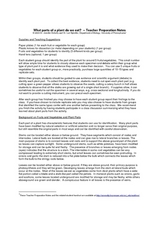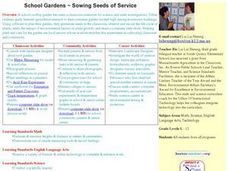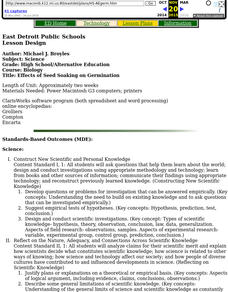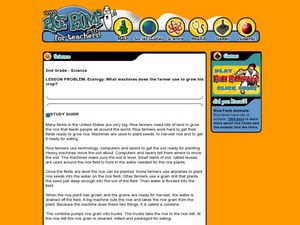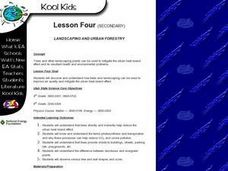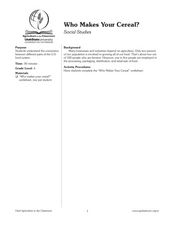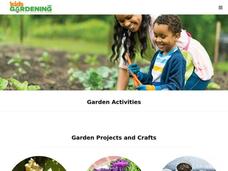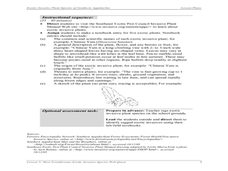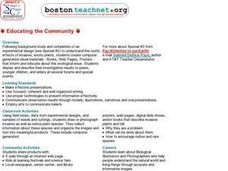Curated OER
Which Parts of a Plant Do We Eat?
Young scholars identify the different parts of a plant. In this biology lesson, students examine its internal parts by dissecting it. They report their findings in class.
Curated OER
Land Use Issues
Students discover seeds are a source of life. They also label the parts of a seed and examine the conditions which are needed for the seed to start growing. They follow the life cycle of seeds.
Curated OER
One, Two, Three. TMV
Students, in groups, design their own experiments to determine how the mode of application of the virus extract affects the various plants that students have grown from seed.
Curated OER
Flower Power
Pupils investigate and explain the basic needs and life processes of plants. Key concepts include: living things change as they grow and need food, water, and air to survive. The reverse of the Kansas quarter serves as inspiration.
Curated OER
Sowing Seeds of Service
Third graders use metric measuring for model and actual plan in designing a roof garden. They photograph the process, record results in a journal, and plant seedlings in small containers. Finally, 3rd graders complete an acid rain...
Curated OER
Turn On A Light And Do Your Own Revegetation
Students use electricity and plant a seed to observe the process when coal is the major fuel source to produce electricity. They use the packet of native seeds to experiment with revegetation.
Curated OER
Effects of Seed Soaking on Germination
Students explain the standard growth pattern of a monocot seedling and word process a finished essay.
Curated OER
Fifth Grade Life Science Review/Quiz
In this life sciences review or quiz worksheet, 5th graders use recall of knowledge to answer multiple choice questions. Students answer 20 questions.
Curated OER
Germination Inhibitors
In germination experiment worksheet, students conduct the following lab activity. Students determine the effects of another tomato on germinating seeds. Students answer the following questions to analyze their experiment.
Curated OER
Now You Have It, Now You Don't
Students compare shipping peanuts made from corn and made from Styrofoam. In this corn based peanuts lesson, students understand why to use eco-friendly materials for packing. Students participate in an experiment to compare the...
Curated OER
Sunny Sunflowers
First graders, after assessing how plants grow in relation to light, create models of sunflowers within a game to help them remember their science lesson. In addition, their visual models serve as a demonstration of photo tropism in...
Curated OER
A Field of Beans
Beans, or legumes as they are sometimes called, are the topic for an integrated multi-subject lesson. Youngsters will read, write, observe, and research everything there is to know about beans. They read a bean story, conduct a bean...
Curated OER
The Wheat Plant
Students sequence stages in the life of a wheat plant. They identify the six main parts of the wheat plant. They plant some kernels of wheat in the classroom so students can watch the growth and development. They record the plant's...
Curated OER
Machines Rice Farmers Use
Second graders investigate rice farming. In this farming equipment lesson, 2nd graders discover what type of equipment is needed to get rice farms ready to plant. Students gain knowledge about what a combine does and how it is important...
Curated OER
Stella the Swan
Students analyze the telling of a story with props. They study similarities and differences between ducks, geese and swans, how wildfowl are adapted to life in water, how wildfowl move and feed, and wildfowl family life, how they nest,...
Curated OER
Landscaping And Urban Forestry - Lesson 4 (Grades 8-9)
Students discuss reasons to plant trees and the best locations for cooling. They study two homes and identify types and locations of trees and determine the placement of the central air conditioners. The class plans a landscape design...
Curated OER
Rice Farming in Texas
Third graders explore how rice farming came to Texas. In this rice farming instructional activity, 3rd graders discover the history of how farmers began to grow rice in the United States. Students color code maps and create a timeline...
Curated OER
Who Makes Your Cereal?
Fourth graders investigate how cereal is produced. In this agricultural lesson, 4th graders discuss where ingredients in cereal come from. Students use picture cards to identify the steps in producing cereal.
Curated OER
Making Paper
Students read about the history of paper production and make their own recycled paper. In this paper making lesson plan, students follow the directions to make paper from recycled paper. Students also learn about making paper from live...
Curated OER
Most Troublesome Exotic Invasive Plant Species Web Quest
Students participate in a Web Quest activity in which they identify common exotic invasive plant species of the Southern Appalachian Region. After identifying the top 10 exotic invasive species, they choose one to research in depth.
Curated OER
Photosynthesis: An enlightening experience
Students observe the effect of light on plants. They illustrate the exchange of gases between the atmosphere and the plant. Students see that plants are part of many natural cycles. They investigate how green plants use the sun's energy...
Curated OER
Salinity Of Soil
Fourth graders investigate the contents of various types of soil to determine the differences in salinity levels. They conduct an experiment of observing the plants in the different soils. Students then determine survival rates by...
Curated OER
Educating the Community
Students research the effects of invasive and exotic plants. They create posters, webpages and books to educate the community. They present their material in different forums.
Cold Spring Harbor Laboratory
Genes Don't Blend
Yellow and blue make green—unless you're studying the inheritance of genetic traits. An interactive lesson explains the difference between blended traits and pure traits and gives examples of their occurrence. The resource includes a...


